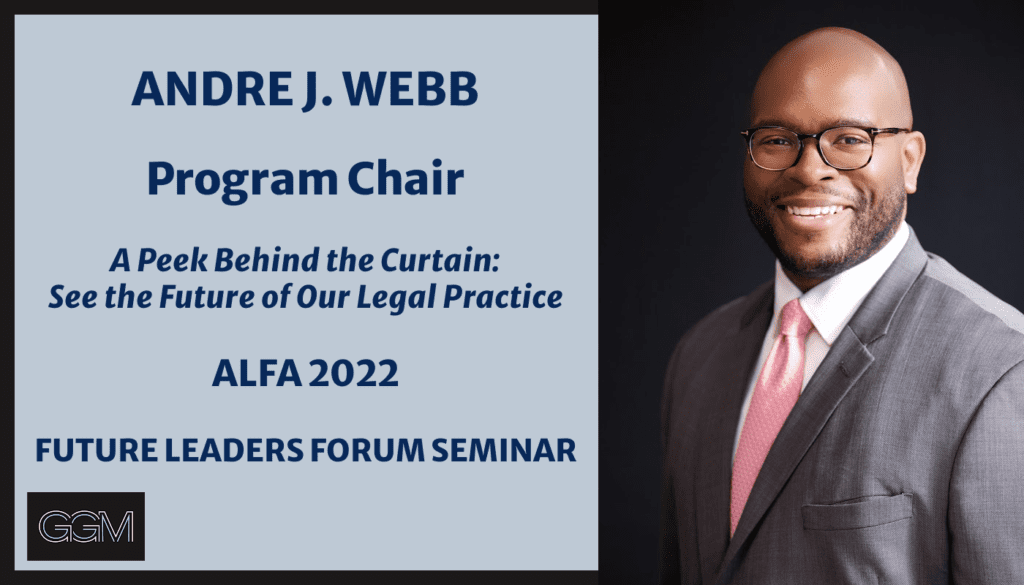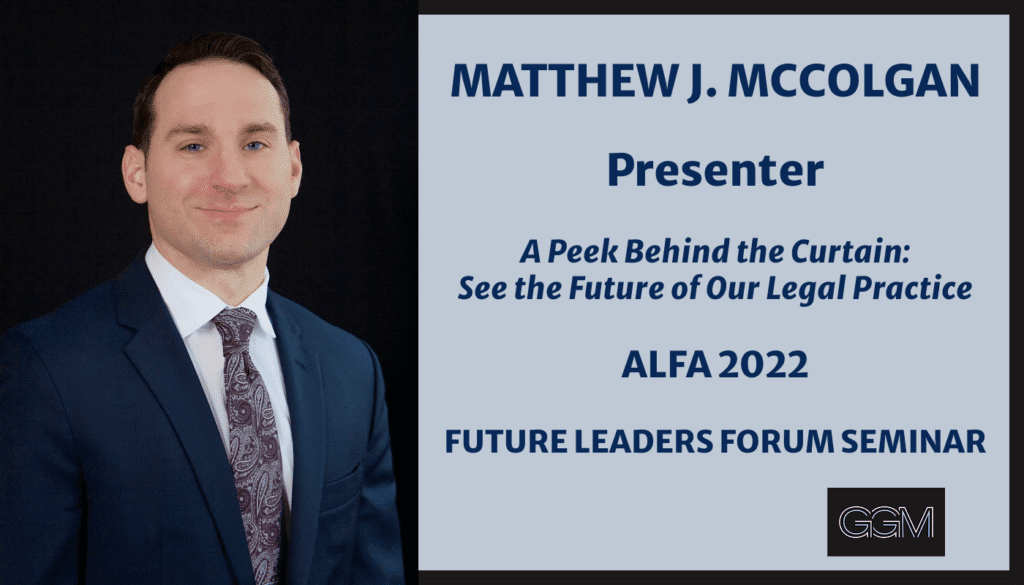
Newsroom
German Gallagher & Murtagh is pleased to announce partner Jeffrey D. Laudenbach has been selected to become a member of the Federation of Defense and Corporate Counsel (FDCC)
German Gallagher & Murtagh is pleased to announce partner Jeffrey D. Laudenbach has been selected to become a member of the Federation of Defense and Corporate Counsel (FDCC). The FDCC is an exclusive, invitation-only international organization of civil defense attorneys in private practice, in-house counsel, risk managers, and insurance claims professionals.
Jeffrey joins fellow GGM members Dean Murtagh and Andre Webb, as well as a select group of 1,200 defense attorneys from the U.S., Australia, Canada, and Europe as part of the FDCC.
The FDCC, comprised of recognized leaders in the legal community who have achieved professional distinction, is dedicated to promoting knowledge, fellowship, and professionalism of its members as they pursue the course of a balanced justice system and represent those in need of a defense in civil lawsuits.
DEAR TRUCKERS: WINTER IS HERE IN PENNSYLVANIA
‘Christine’s Law’ Elevates Driver Duties to Remove Snow and Ice
Starting September 2022, drivers on Pennsylvania highways are required by statute to exercise increased vigilance during the winter months. “Christine’s Law”, as it is known, regulates the removal of snow and ice, snowballing the duty of drivers operating vehicles on a Pennsylvania highway to make “reasonable efforts” to remove any accumulated ice or snow from their vehicle – including the vehicle’s hood, trunk, and roof – within 24 hours after the cessation of the wintery precipitation. “Vehicle”, as used here, includes trailers. Failure to do so subjects the driver to a fine of $50.00 for each offense.
Christine’s Law creates a heightened duty for drivers more than that of its predecessor rule. Under the previous, now-repealed statute, drivers were only subject to fines when snow or ice actually became dislodged from their vehicle and struck another vehicle or pedestrian, causing serious bodily injury or death. If the same were to happen now, under Christine’s Law, the operator of a moving vehicle from which ice or snow was dislodged and caused serious bodily injury or death is subject to a $200 – $1,500 fine for each offense.
The language of Christine’s Law makes sure to include “motor carrier vehicle,” making the new regulation applicable to many commercial trucking and transportation vehicles. This means that commercial drivers who find themselves operating vehicles on Pennsylvania highways have the same duty as non-commercial drivers to make reasonable efforts to remove snow and ice from the hood, trunk, and roof of their commercial vehicles.
While the impact of Christine’s Law appears to apply to commercial and non-commercial vehicles alike, the new regulation has several exceptions which appear exclusive to commercial trucking. The duty to make reasonable efforts to remove snow and ice does not apply if the driver of a commercial vehicle is en route to a facility to remove accumulated ice or snow at the time of a traffic stop for non-removal. This duty is also alleviated if complying with the law would cause the commercial driver to violate any other law (state or federal), a workplace safety regulation, or would threaten the driver’s health and safety.
With this new requirement in place, we should expect trucking companies to respond with precautionary practices. Of course, many companies already have established policies and procedures to avoid this safety issue. Companies that have deferred these precautionary measures to their drivers should consider implementing new policies and providing drivers with a means of complying with the law, including providing snow removal equipment at local facilities.
Of note, this law not only applies to Pennsylvania-based companies and drivers, but also to any driver who finds themselves on Pennsylvania roads. Thus, a vehicle domiciled in, say, Arizona, which anticipates traveling through this Commonwealth in wintery months should consider how it will exercise these precautionary measures in the foreign venue. Scheduling an appropriate stop in the driver’s manifest or itinerary should be a factor. Companies may consider working with “competitors” that possess available snow removal equipment in the Pennsylvania locale where a driver expects to be traveling, to allow for use of this equipment. In fact, scheduling a stop for the purpose of snow removal may serve as documentary evidence demonstrating the “en route” exception noted in the law.
Christine’s Law receives its name from the tragic death of Christine Lambert of Palmer Township, Pennsylvania who, on Christmas Day in 2005, was killed by a large piece of ice that crashed through her windshield after becoming dislodged from a passing box truck. Christine’s Law seeks to prevent tragedies like Christine’s death. Most trucking companies always prioritize safety. These changes elevate the industry standard for vehicular snow and ice removal in Pennsylvania.
GERMAN, GALLAGHER & MURTAGH, P.C.
Matthew J. McColgan, Esq.
Tamarrin J. Johnson, Esq.
The Passing of a Legend – Robert “Bob” Corbin
It is with deep sadness and heavy hearts that we announce the passing of one of our former partners, Robert “Bob” P. Corbin. Bob was a trusted colleague and true friend. He was a Partner with GGM from its inception in May of 1980 through his retirement in May of 2019. Bob passed peacefully on November 20, 2022. Bob was a magna cum laude graduate of Dickinson College and a member of Phi Beta Kappa at Cornell University, where he received his JD. His near 40–year career at German Gallagher & Murtagh included his litigation of cases in transportation and trucking, products liability, professional malpractice, insurance coverage, toxic tort and claims of general negligence. He was an active member of ALFA International, the American Bar Association, the Defense Research Institute, the Philadelphia Bar Association and the Transportation Lawyers Association. Bob received Martindale-Hubbell’s AV Peer Review Rating, which recognizes lawyers for their legal ability and ethical standards. He was a true mentor, giving the firm everything he had until the day he left and even after. He will be truly missed by everyone who knew him.
German Gallagher & Murtagh is pleased to announce partner Andre J. Webb has been selected to become a member of the Federation of Defense and Corporate Counsel (FDCC)
German Gallagher & Murtagh is pleased to announce partner Andre J. Webb has been selected to become a member of the Federation of Defense and Corporate Counsel (FDCC). The FDCC is an exclusive, invitation-only international organization of civil defense attorneys in private practice, in-house counsel, risk managers, and insurance claims professionals.
Andre joins fellow GGM member Dean Murtagh, as well as a select group of 1,200 defense attorneys from the U.S., Australia, Canada, and Europe as part of the FDCC.
The FDCC, comprised of recognized leaders in the legal community who have achieved professional distinction, is dedicated to promoting knowledge, fellowship, and professionalism of its members as they pursue the course of a balanced justice system and represent those in need of a defense in civil lawsuits.
GGM Associate highlights work of local grief-support organization in Legal Intelligencer
 Brian O. Sumner, an associate in GGM’s worker’s compensation group, co-authored an op-ed calling attention to the work of the Uplift Center for Grieving Children in the Philadelphia Juvenile Justice Center. Uplift provides grief support groups for children who have experienced a loss. The op-ed was published to coincide with National Children’s Grief Awareness Day and describes the work Uplift does with incarcerated youth, as well as youth in the wider Philadelphia community.
Brian O. Sumner, an associate in GGM’s worker’s compensation group, co-authored an op-ed calling attention to the work of the Uplift Center for Grieving Children in the Philadelphia Juvenile Justice Center. Uplift provides grief support groups for children who have experienced a loss. The op-ed was published to coincide with National Children’s Grief Awareness Day and describes the work Uplift does with incarcerated youth, as well as youth in the wider Philadelphia community.
Grieving Youth in the Justice System: A Call for Help From the Legal Community
This Children’s Grief Awareness Day, attorneys should seek to understand the impacts of grieving youth in the juvenile justice system.
By Michelle Gonzalez, Samantha Anthony, Kristine Grady Derewicz and Brian O. Sumner
Today is Children’s Grief Awareness Day. How is this relevant to our legal community? Grief, a physiological and psychological response to loss, is often overlooked as a contributor to decision making. Many youth involved in the juvenile justice system have experienced a loss and are grieving. In Chicago, one study found the prevalence of loss due to death to be 88% for detained adolescents, while another in San Diego found the prevalence of loss to be 71.9%. We know that an estimated 5.6 million children in the United States will experience the death of a parent or sibling by age 18—not including the deaths of caregivers and other loved ones, reasonably suggesting that the number of grieving youth is actually much higher. The many ways that youth respond to loss can influence behaviors that land youth in the juvenile justice system. If we understand the impacts of grief, then we can identify and support grieving youth, particularly those involved in the juvenile justice system.
Philadelphia’s Uplift Center for Grieving Children provides free grief support services to youth at the Philadelphia Juvenile Justice Services Center who can range in age from 10 to 18. As lawyers, we should be aware of and support this important work as one component of a wholistic approach to addressing healthy development of the youth of our city.
All people experience grief in connection with the death of a loved one, or more ambiguously as a result of loss of connection, stability or physical presence. A grieving youth may be experiencing the loss of more than one person, and these deaths may be due to homicides, suicides, or natural causes, perhaps witnessed by the youth. A still-developing brain can contribute to the challenges youth experience when coping with the impact of grief. We re-grieve at every developmental stage, meaning the way we respond to grief over our lives may change as our brain development changes.
As stated, grief is often overlooked as a contributing factor to behavior. The U.S. Office of Juvenile Justice and Delinquency Prevention estimates that 424,300 juveniles were arrested in 2020, with a suggested recidivism rate of about 30% according to two studies. How many of those youth were grieving when they engaged in the behavior that resulted in an arrest? Some offenses which correlate with grief responses are assault, theft, and drug abuse violations. Research confirms that grief impacts the brain in ways that compromise the youth’s ability to make healthy and safe decisions. Grieving youth may engage in risky behaviors which can include drug and alcohol use. They withdraw socially and experience change in activity levels. Their concentration and productivity are affected. They are restless and often don’t sleep well. They often experience symptoms of depression, anxiety, and panic. Fundamentally, their decision-making capacity is affected as a result of grief.
Many grieving youth do not have support or resources to understand and manage their emotions, and as a result may engage in behaviors and make choices that lead to engagement with the juvenile justice system. Typical grief responses in youth—risk-taking and compromised cognitive processing primary among them—are exactly the behaviors that underlie many juvenile offenses. Their response to a loss may be the very thing that lands them in the juvenile justice system, perhaps more than once.
The Uplift Center for Grieving Children has been supporting the Philadelphia community with free grief services for over 20 years. The clinicians at Uplift, each of whom holds a master’s degree, work with youth who are housed at the Juvenile Justice Services Center. From June to October 2022, Uplift worked with 41 youths, approximately 22% of the youths housed in the JJSC, all of whom had experienced the death of someone significant to them. Uplift’s grief program at the PJSSC is an intentional and individualized program that creates a space for youth to make meaning of their grief experience and equip themselves with tools for coping with grief and other correlating mental health issues. The program focuses on exploring feelings, coping skills, honoring memories, and identifying supports. The youth do this through use of art therapy based activities as well as use of literature and exploratory writing. Youth who attend the program are provided a certificate of completion as a way of demonstrating their commitment to their journey of healing. Participation in mental health programs like Uplift’s peer grief support groups, may help reduce recidivism and help youth exit the criminal justice system earlier.
Outside of the juvenile justice system, Uplift provides peer-support for grieving youth throughout the city, partnering with the Philadelphia School District and community-based organizations, and offering services in its facility in East Falls. Uplift also operates the Philly HopeLine, connecting grieving youth with resources and support for navigating grief. On its website, Uplift provides resources for grieving youth, their families and caregivers.
At a time when our legal community is called upon to engage meaningfully in our civic discourse around crime prevention and minimizing recidivism, systemic collaboration between the justice system and the mental health system is integral in this work. The work of the clinicians at Uplift Center for Grieving Children is a key component of that conversation. To successfully rehabilitate youth involved in the juvenile justice system, we must also provide support for the grief in their lives. On this Children’s Grief Awareness Day, we invite our colleagues in the legal community to consider the effect of grief on youth and the meaningful impact that grief support services have for the affected youth and their families.
For more information, please visit www.upliftphilly.org.
Michelle Gonzalez is the senior bilingual clinician at Uplift Center for Grieving Children in Philadelphia. Samantha Anthony is a senior clinician at Uplift. Kristine Grady Derewicz is a shareholder at Littler Mendelson and an Uplift board member and Brian O. Sumner is an associate with German Gallagher & Murtagh and an Uplift young professionals board member.
Reprinted with permission from the November 17, 2022, edition of The Legal Intelligencer© 2022 ALM Global Properties, LLC. All rights reserved. Further duplication without permission is prohibited, contact 877-257-3382 or reprints@alm.com.
GGM is pleased to announce its newest Litigation Associate Tamarrin J. Johnson
 GGM is pleased to announce the addition of a new litigation associate, Tamarrin J. Johnson. At GGM Tamarrin will focus her practice on the defense of insured and self-insured entities in casualty and transportation matters. Before joining GGM, Tamarrin practiced in Philadelphia, Pennsylvania, concentrating on commercial and business litigation, including representing companies and entities in a broad range of civil matters in state and federal court.
GGM is pleased to announce the addition of a new litigation associate, Tamarrin J. Johnson. At GGM Tamarrin will focus her practice on the defense of insured and self-insured entities in casualty and transportation matters. Before joining GGM, Tamarrin practiced in Philadelphia, Pennsylvania, concentrating on commercial and business litigation, including representing companies and entities in a broad range of civil matters in state and federal court.
Tamarrin graduated from the Villanova University Charles Widger School of Law. While in law school, she served as Associate Editor of the Villanova Environmental Law Journal and as Chief of Staff for the National Black Law Students Associations.
Andre J. Webb Achieves Directed Verdict on Behalf of Client
Defense Win!
On October 20, 2022, Andre J. Webb secured a directed verdict on behalf of his client after a one-week trial in the Philadelphia County Court of Common Pleas.
The trial involved a motor vehicle accident where liability was contested, and the plaintiff alleged injuries to the neck, back, shoulder, and knee. Following the completion of the plaintiff and defendants’ case in chief, Mr. Webb argued that there was insufficient evidence presented for a trier of fact to place any liability for the accident on his client. The judge agreed and granted the Motion For A Directed Verdict.
Jeffrey Laudenbach Presented at the ALFAI 2022 Annual Business Meeting
Jeffrey Laudenbach presented at the ALFAI 2022 Annual Business Meeting on October 20, 2022 in Dublin, Ireland. The presentation was entitled “MEMBER FIRM TIPS – THERE IS NO RULE AGAINST PERPETUITY, SUCCESSION PLANNING FOR TOMORROW WITHIN ALFAI”. The panel presented strategies and discussed the advantages of involving and investing in the future leaders of ALFAI and the return it will have for your firm. This presentation was followed by a roundtable discussion on methods you can share with other ALFAI members on how to better strengthen their bench. For more information, please reach out Mr. Laudenbach at laudenbachj@ggmfirm.com.
Andre J. Webb served as Program-Chair of ALFA International’s 2022 Future Leaders Forum Seminar
Andre J. Webb served as Program-Chair of ALFA International’s 2022 Future Leaders Forum Seminar held at the Omni Hotel in Louisville September 21-22nd. Entitled “A Peek Behind the Curtain: See the Future of Our Legal Practice,” the conference featured ALFA International member firm attorneys and clients from a wide range of companies and corporations speaking on many topics with a forward-focused lens, homing in on areas such as the future of litigation, the future lawyer’s toolbox, how to keep future lawsuits from spinning out of control and preparing a client for a 30(b)(6) deposition. For more information, please reach out to Mr. Webb at webba@ggmfirm.com.
Matthew McColgan will present at the ALFA International’s 2022 Future Leaders Forum Seminar
Matthew McColgan will present at the ALFA International’s 2022 Future Leaders Forum Seminar on Thursday, September 22, 2022. The presentation is entitled “The Future Lawyer’s Toolbox,” the program will look at how we, as a practice, have utilized the recent technological developments to achieve success in defending and advocating for our clients. The program will also explore what the future generation of practitioners should aim to master to support their position at trial as plaintiff and defense tactics advance and evolve. For more information, please reach out Mr. McColgan at mccolganm@ggmfirm.com.










